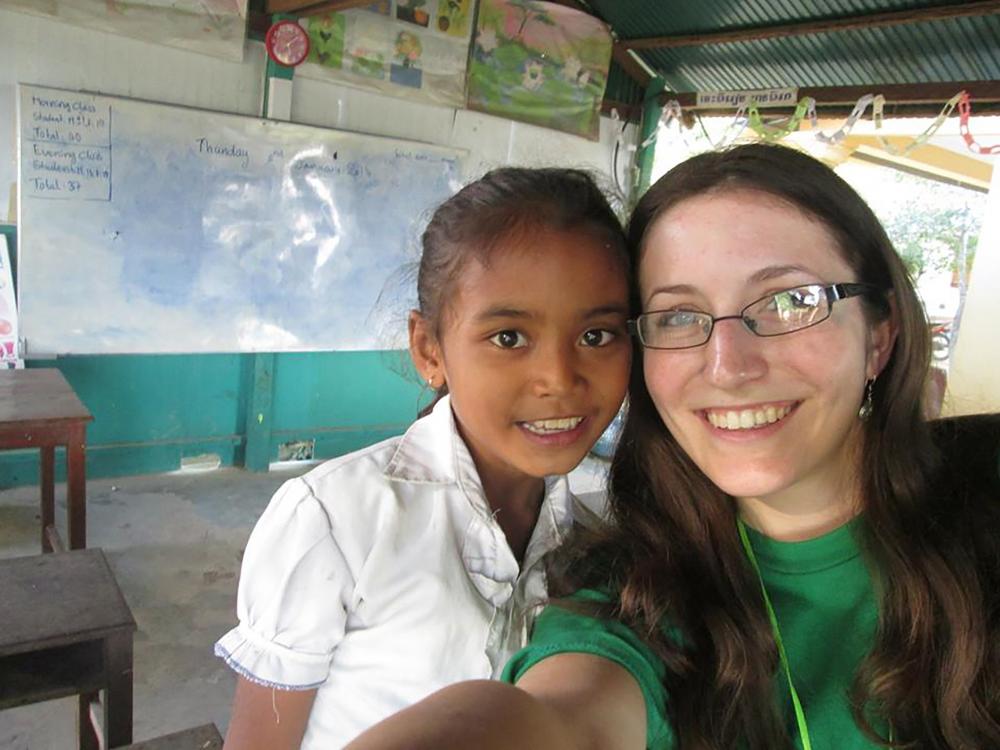ADA – Linzi Thompson is not the kind of person who kicks back with rest and relaxation during her breaks from pursuing an East Central University degree.
Her passion for environmental health science leads to very little idle time for the junior from Sulphur.
A double-major in environmental health science and chemistry, Thompson is headed to China this summer for an internship, through Alabama A&M University’s Research Experience for Undergraduates and funded by the National Science Foundation. This is coming off the heels of a trip to Cambodia over the Christmas break in which she did marine conservation research and taught English to children.
Thompson’s 10-week stay in China, from May 18-July 20, is expected to include research on heavy metal pollution. Her mentor will be Dr. Elica Moss and Dr. Malinda Gilmore, who will not be making the trip, but will be providing guidance via Skype from Alabama A&M.
Thompson is one of only 10 applicants, out of 150 from across the country, selected to make the trip. She will be staying at Nanjing Forestry University and gaining six credit hours through this internship experience.
Though this trip will be fully-funded, her previous trip to Cambodia came at her own expense. She paid her own way, at nearly $3,000, to make the three-week journey to the Asian country in December, applying her knowledge, skills and zest in conservation research.
Thompson made the trip through a group called the Society for Environmental Exploration, headquartered in London, England.
“I wanted to see another part of the world. I had never been to Asia before,” Thompson said.
A long bus ride, which took eight hours instead of the intended six, was Thompson’s first experience. Twenty-five people were crammed into a 20-person van, with chickens in the back, according to Thompson
“It was one of the most unique things. I was the only English-speaking person on the bus,” said Thompson.
Her first stop was to a tiny undeveloped island, called Koh Smach, in which only 25 people inhabited, including two projects coordinators - a man named Jack and a woman named Gen Labram, and a couple of stray dogs. Thompson spent a week with the pair studying the fish found in the island’s coral reef so she could assist with a fish survey.
“It’s like taking a fish or coral census,” she said. “The reason for the research was that tourist development was taking place across the bay of the Gulf of Thailand and it could have a negative impact on the reef.”
Thompson’s living arrangements included no electricity or running water. She drank rainwater and bathed with a bucket of water drawn from a well. It also included open-air sleeping on a hammock in a small shack.
“I think one of my favorite parts of the trip was living on the island. We caught fish for dinner by throwing out nets,” said Thompson. “I think the other was teaching English to the kids.”
Her teaching duties started with a 12-hour ride, in a crammed van, across the country with Labram to Siem Reap, where the pair assisted with teaching English to children. The pair stayed in a two-story house owned by the Society of Environmental Exploration. Their modes of transportation were bicycles to school each day.
Once they arrived at the school, Thompson and Labram served as teaching assistants to approximately 200 students, ages 4-18. They spent 7:30 a.m. to 4 p.m. in instruction each day in classrooms, many of which were outdoors.
It was certainly a bonding experience for Thompson and the children.
“The kids put on a big Christmas celebration when we arrived,” Thompson said. “I couldn’t think of a better way to spend Christmas break. It was a beautiful place and it was amazing to work with the kids and see areas where most people wouldn’t get to see.”
Thompson is a Fred and Mary Pfeffer Scholarship winner in biology for 2013 and 2014 and a Francisco-Hatchett Scholarship winner in biology for 2014.
She is a member of the University Honors Program, McNairs Scholars Program and NASA Fellowship Program and has consistently made the President’s Honor Roll from 2011 to present.
-ECU-


